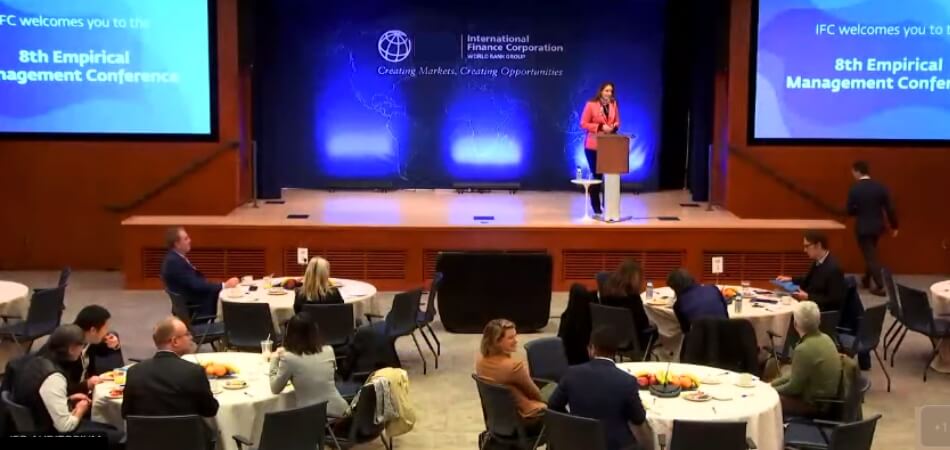A professional tasked with guarding assets and investments must be able to navigate the complexities of financial stewardship. At the heart of this intricate world lies the Financial Management Conference, a pivotal gathering that serves as a beacon for knowledge in the industry.
But, what is a Financial Management Conference?
It’s an online training event designed to spotlight the intricate fiduciary responsibilities while equipping attendees with the latest approaches, processes, and strategies vital for proficient financial research administration.
With a focus on practical education and strategic insight, this conference represents a critical stepping stone for effective financial management. Join us as we explore the transformative potential of this event in the following article.
A Quick Brief on the Financial Management System
Understanding the intricacies of financial oversight is essential in today’s economy. A Financial Management System (FMS) stands as the cornerstone for this. It’s a vital tool for achieving fiscal efficiency and compliance.

An FMS streamlines processes, ensuring accurate tracking, reporting, and managing of financial resources. It integrates various financial functions, including accounting, budgeting, procurement, and assets. This consolidation aids in real-time financial data analysis, crucial for strategic decision-making.
Efficient FMS implementation leads to enhanced transparency and stewardship of financial activities. It allows stakeholders to monitor funds and make informed decisions swiftly. Ultimately, this system fosters financial integrity and optimizes economic performance across organizations.
What is a Financial Management Conference?
In the realm of finance, knowledge-sharing events are pivotal for professional growth and strategic development. A Financial Management Conference stands out in this domain. It serves as a crucible for refining financial acumen and networking.
A Financial Management Conference is an interactive online platform where experts in finance convene to discuss industry trends. Participants gain insights into fiduciary responsibilities and explore financial management’s latest advancements. The event’s structure typically includes keynote speeches, workshops, and collaborative sessions to exchange best practices. It’s an opportunity for professionals to broaden their skill set in financial research administration.

These conferences delve into the complexities of financial planning, risk management, and resource allocation. They foster an understanding of how to navigate financial regulations and implement effective governance. Attendees leave with a strengthened ability to influence their organizations’ fiscal health positively. Engaging in this environment, they acquire actionable strategies for financial oversight and sustainability.
Additionally, such gatherings underscore the significance of innovative financial strategies in dynamic economic climates. They highlight the necessity of adapting to technological changes that impact financial operations. This focus ensures that financial leaders stay ahead in a technology-driven marketplace. It’s a blend of foresight and practicality, equipping attendees with the foresight for future challenges.
By attending a Financial Management Conference, finance professionals can elevate their strategic thinking and operational effectiveness. It’s a chance to network with peers, gain fresh perspectives, and reinvigorate one’s approach to financial stewardship. The knowledge imparted here resonates well beyond the confines of the event, shaping careers and the financial landscape alike.
Types of Financial Management Conferences You Can Attend
Delving into financial management conferences can unveil a wealth of specialized knowledge tailored to diverse professional needs. Each type offers unique insights, from corporate finance to nonprofit fund management. Selecting the right conference can catalyze career advancement and organizational growth.
Corporate Finance Conferences
These events cater to executives seeking to navigate the corporate fiscal landscape with acumen. Sessions cover mergers, acquisitions, capital raising strategies, and shareholder value maximization. Networking opportunities abound, connecting attendees with industry leaders and innovators.
Nonprofit Financial Management Conferences
Here, the focus is on fiscal stewardship within the nonprofit sector, addressing fundraising, grant management, and budgeting for social impact. The conferences offer guidance on maintaining donor trust and regulatory compliance. They are crucial for those managing funds where every dollar must be justified.
Investment Management Conferences
Investment professionals gather here to dissect market trends, portfolio management, and financial instruments. Discussions often revolve around risk assessment, asset allocation, and maximizing returns. Such conferences are goldmines for fund managers and individual investors alike.
Personal Finance Conferences
Aimed at improving individual financial literacy, these forums discuss savings, retirement planning, and debt management. They demystify financial principles for non-professionals, emphasizing practical advice for everyday money management. These events empower attendees to make informed personal financial decisions.
Financial management conferences come in varied flavors, each designed to sharpen specific skills and deepen financial understanding. Whether you’re scaling the corporate ladder, guiding a nonprofit to fiscal sustainability, or managing investments, there’s a conference tailored to your needs. Choose wisely to forge a path to financial mastery that aligns with your career goals and personal aspirations.
Why Should You Attend a Financial Management Conference?
Financial management conferences offer a concentrated dose of industry knowledge and networking that’s hard to replicate in daily work environments. They’re catalysts for both personal and professional growth. Here’s why you should consider attending one.
Cutting-Edge Industry Insights
At these conferences, you’re exposed to the latest financial trends and regulatory changes before they hit mainstream discussion. You learn about emerging technologies like blockchain and AI that are reshaping financial strategies. This early knowledge can become a competitive advantage.
The insights gained here help you anticipate market shifts and prepare for future challenges. Expert speakers often share their analyses of economic patterns, offering valuable takeaways. It’s knowledge that can significantly impact your decision-making process.
Networking Opportunities
Conferences provide a rare opportunity to connect with a diverse range of financial professionals. You’ll meet potential mentors, collaborators, and even future employers. These relationships can be invaluable as you navigate your career.
Beyond mere introductions, these events foster deeper connections through social events and breakout sessions. You can find peers facing similar challenges, share solutions, and build a professional support system. Such networks often lead to collaborative and business opportunities.
Professional Development
Workshops and seminars at these events are designed to refine your skills and expand your expertise. They often provide certifications that can enhance your resume. It’s professional development that can accelerate your career advancement.
The skills learned at a financial management conference are both current and relevant, ensuring you stay ahead in your field. From technical know-how to leadership training, your professional toolkit will grow in breadth and depth. This makes you a more valuable asset to your organization.
Innovation and Strategy
Conferences serve as a breeding ground for innovative ideas and strategic thinking. You’ll see how leaders are solving financial challenges creatively. This can inspire you to think differently about the problems you face.
You’ll also get a sense of the strategic trends shaping the industry. This perspective is crucial for aligning your organization’s goals with the broader financial landscape. It’s a way to ensure relevance and sustainability.
Personal Growth
On a personal level, stepping out of your comfort zone can stimulate new ways of thinking. The experience can refresh your outlook on your career and ambitions. Such personal growth is often underestimated but immensely valuable.
You also develop soft skills, like public speaking and negotiation, by engaging with others and participating in discussions. These skills are transferable to any career path within the financial sector. It’s an investment in yourself that pays lifelong dividends.
Access to Resources
Conferences often provide access to exclusive materials, tools, and research findings. These resources can be game-changers for your organization. They allow you to implement what you’ve learned immediately.
The resource pool extends to software demonstrations and access to proprietary data analyses that can improve your work efficiency. It’s a practical takeaway that can lead to significant improvements in your financial management practices.
To sum up, attending a financial management conference can be a transformational experience. It can offer fresh perspectives, cultivate necessary skills, and connect you with the pulse of the industry. Whether you’re a seasoned finance professional or just starting out, the right conference can provide a powerful boost to your career trajectory and open doors to future success.
Tips to Find the Perfect Financial Management Conference for You
Choosing the right financial management conference can be a pivotal step in your professional development. It’s about finding the perfect match for your current needs and future goals. Here are some tailored tips to guide your selection process:
- Identify Your Focus: Determine what aspect of financial management you want to delve into. A clear focus ensures the conference offers the content you seek.
- Research Speakers: Look into the experts and thought leaders who will be presenting. Esteemed speakers can provide invaluable insights and learning opportunities.
- Check the Agenda: Review the conference schedule for sessions and workshops that align with your interests. A relevant agenda is crucial for a worthwhile experience.
- Consider the Network: Opt for conferences known for attracting professionals in your field. Networking with the right peers can open doors to new opportunities.
- Assess the Format: Decide if you prefer in-person interaction or the convenience of a virtual event. The format can greatly affect your engagement and learning.
- Weigh the Costs: Evaluate the cost against the potential benefits, including travel expenses for on-site events. Financial feasibility is key to making a smart decision.
- Read Reviews: Seek feedback from past attendees to gauge the conference’s impact. Their experiences can signal the event’s true value.
- Look for Extras: Some conferences offer additional resources, like post-event materials or membership access. These extras can enhance the overall benefit of attending.
Selecting the perfect financial management conference is a strategic decision that should be approached with diligence and foresight. By considering these tips, you can ensure that the event you choose not only aligns with your professional objectives but also provides a rich environment for learning and networking. Let the conference you select be the catalyst for your next big career leap.
Final Words
In navigating the myriad paths of fiscal responsibility, the significance of pinpointing ‘what is a Financial Management conference?’ becomes clear. Such conferences act as lighthouses, guiding through the fog of financial complexity, and offering enlightenment and community.
By carefully selecting a conference that aligns with one’s professional journey, individuals can unlock a trove of benefits from unparalleled insights to expansive networks. These events stand not just as forums for education but as catalysts for innovation and personal growth.
Ultimately, they reinforce the importance of continual learning and connection within the finance sector, underpinning the success of those committed to mastering the art and science of financial stewardship.






